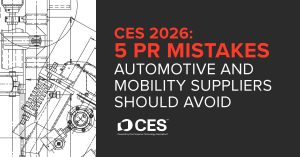La capsula Informativa: Reporters Want Companies to Talk About Tariffs…But Companies Don’t Want to

There was a time, about 20 years ago, when I was a young reporter covering auto suppliers and I was frantically calling companies trying to find one that would talk on the record about whatever the highest profile political issue was at the time.
Surprise! Nobody, or almost nobody, was willing to talk on the record. Sure, some companies provided a short, written statement. And some savvy PR professionals who I had begun to build relationships with took pity on me and provided a little bit of context on background that was helpful.
But for the most part, I was told to call industry legends like Neil DeKoker at OESA and Dave Cole at CAR and was told they spoke for the collective auto industry. So, I learned to get what I could from industry associations while also scouring quarterly earnings calls for opaque but telling financial details.
At the time, I found the situation to be frustrating – and not just because I could not get honest and transparent answers from the companies I was dealing with. I believed then, as I do now, that the industry puts itself at a collective disadvantage in Washington by failing to advocate more loudly and boldly for itself.
In 2016, when Donald Trump was running for office for the first time, he was regularly criticizing automakers – especially Ford – for producing vehicles in Mexico as he vowed to scrap the North America Free Trade Agreement (NAFTA). Ford was reluctant to respond, at first, with much more than a written statement, but eventually relented.
I remember when Ford CEO Mark Fields went on CNN to talk to Poppy Harlow and provide the company’s perspective. Fields explained why Ford produces some vehicles in Mexico while emphasizing the company’s commitment to the U.S. His appearance on CNN seemed to slow down, but not stop, Trump’s criticism of the company’s Mexico production.
Flash forward to today and the hottest political and policy issue facing the auto industry is tariffs. Tariffs, more than any other issue, are dominating the automotive industry’s news cycle.
A half dozen or so reporters who I’ve spoken with in recent weeks have expressed a mixture of frustration, exhaustion and gallows humor about the frantic tariff news cycle and how it has consumed their work life.
Among their frustrations: Their inability to convince companies to talk in detail and on the record about tariffs.
At Franco, we have several clients who are closely watching the Trump Administration’s rapidly changing tariffs. Almost all our automotive clients are closely monitoring the news about tariffs while also staying in close contact with their government affairs staff and other industry contacts.
Many of our clients have also spent time developing media holding statements in case media calls and asks for their position while other clients who have committed to media interviews on other topics have spent time carefully thinking through what they intend to say when the inevitable questions about tariffs come up. Still others have delayed media outreach efforts knowing almost any media interview right now would include questions about tariffs.
Today, the voices automotive suppliers and automakers are leaning on to talk about the potential impact of tariffs include: Glenn Stevens at MichAuto; John Bozzella, President of the Alliance for Automotive Innovation; the Motor & Equipment Manufacturers Association (MEMA) and a handful of well-connected analysts, such as Stephanie Brinley at S&P Global Mobility and a recent webinar hosted by Anderson Economic Group.
On March 5, Glenn Stevens from MichAuto said:



